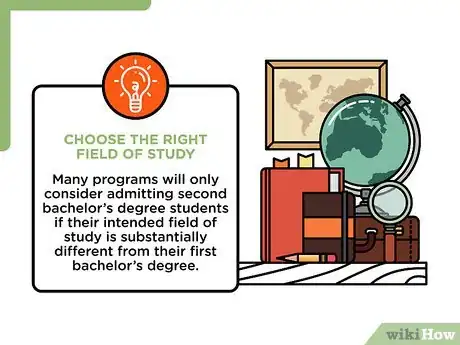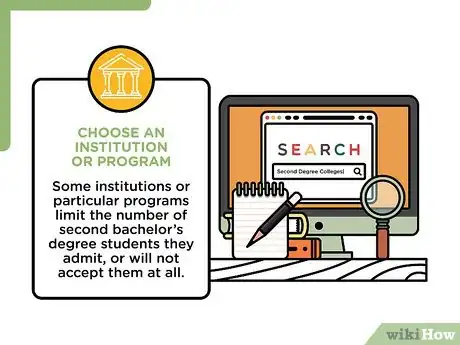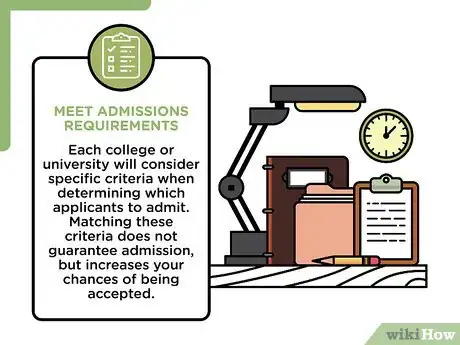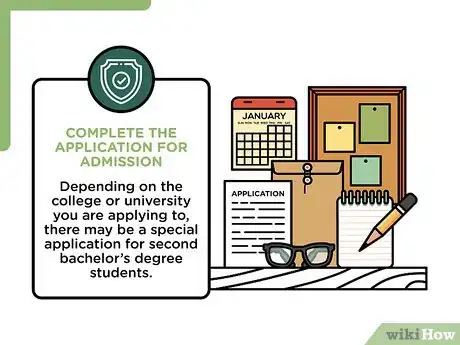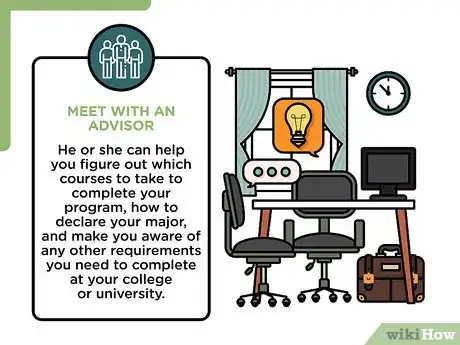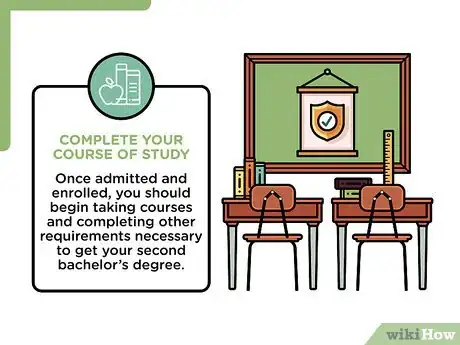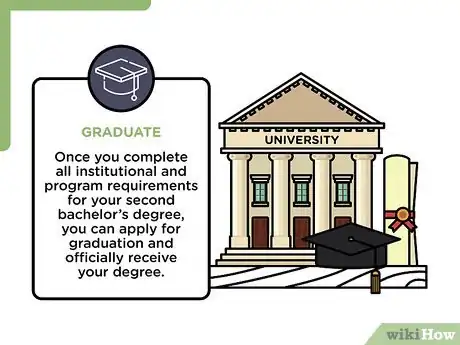This article was co-authored by Katherine Demby. Katherine Demby is an Academic Consultant based in New York City. Katherine specializes in tutoring for the LSAT, GRE, SAT, ACT, and academic subjects for high school and college students. She holds a BA in History and Political Science from the University of North Carolina at Chapel Hill and a JD from Yale Law School. Katherine is also a freelance writer and editor.
There are 15 references cited in this article, which can be found at the bottom of the page.
This article has been viewed 406,701 times.
If you're still in college, getting a second bachelor's degree could be as easy as picking up a second major.[1] If you've already graduated from college, it's a bit trickier. Getting a second bachelor's degree can be an important step in retooling your career or deepening your knowledge about a particular subject. There are challenges involved, however, including constraints on time, money, and enrollment policies. Before beginning a second bachelor’s degree program, research which institutions and courses of study are right with you. If you enroll in a program, stay aware of policies by contacting advisors so that you can complete your degree as efficiently as possible.
Steps
Deciding on a Plan of Study
-
1Consider whether or not a second bachelor’s degree is the right plan for you. For many careers and goals, having just a single bachelor’s degree is sufficient. Those interested in more advanced study in a particular field might consider entering a graduate school program instead of earning a second bachelor’s degree, since graduate degrees can open additional career possibilities and provide more substantial qualifications if you want to work in a particular field.
- Second bachelor’s degrees make the most sense if a career change or other factor requires you to acquire a body of knowledge in a substantially different field.[2]
- Some potential employers or others who review your credentials might see earning a second bachelor’s degree as showing a lack of commitment, so be prepared to explain your reason for earning one if you decide it is the best plan for you.
- Many graduate programs don't necessarily require an undergraduate degree in the same field as a prerequisite for admission. For instance, you may be able to enter a graduate program in Sociology even if your undergraduate degree is in Anthropology, or a program in English if your bachelor's degree is in Computer Science. With this in mind, consider whether a graduate program or a second bachelor's degree is the best option for your plans. You can contact the graduate coordinator of the program you're interested in for details.
-
2Choose the right field of study based on your career plans and an institution’s admissions requirements. Many programs will only consider admitting second bachelor’s degree students if their intended field of study is substantially different from their first bachelor’s degree.[3] [4] [5] For instance, if you already have a bachelor’s degree in biology, some institutions will not admit you if you want to earn a second bachelor’s degree in microbiology. However, the same institution might consider admitting you if you want to earn a second bachelor’s degree in computer science.
- Generally, the intention of most colleges and universities is to award first bachelor’s degrees to students.[6]
Advertisement -
3Determine how you would fund a second bachelor’s degree program. While you may be able to find some financial aid as a second bachelor’s degree student, many loans, grants, and scholarships are only available to first bachelor’s degree students. When selecting a school and program, or deciding to get a second bachelor’s degree at all, make sure to consider the cost of attendance (tuition, fees, living expenses, etc.).
- You can find information about costs of attendance at a particular college or university via its admissions website.
- Private loans may be available to fund a second bachelor’s degree program, but can have high interest rates.
- Contact an institution’s financial aid office about particular sources of funding that might be available to you as a second bachelor’s degree student.
Applying for Admission
-
1Choose an institution or program you are permitted to enroll in. Some institutions or particular programs limit the number of second bachelor’s degree students they admit, or will not accept them at all.[7] This is more frequently the case for high-demand courses of study or at campuses where student enrollment is at or above capacity. If this is the case for you, either look for a different institution to study the same subject at, or choose a different program of study at the same institution.
-
2Meet admissions requirements. Each college or university will consider specific criteria when determining which applicants to admit. Matching these criteria does not guarantee admission, but increases your chances of being accepted. For applicants seeking a second bachelor’s degree, common admissions requirements include:[11]
- Completion of a four-year college course of study leading to a bachelor’s degree. Most colleges and universities require your first bachelor’s degree to have been awarded by a regionally accredited institution.
- Previous good standing at the last college or university you attended.
- A good GPA. Many institutions require second bachelor’s degree applicants to have maintained a GPA above a certain threshold, particularly if the intended concentration is in a high-demand field.
- If you are an international student, there may be additional admissions requirements for you, such as certifying language competency or showing proof of accreditation for your previous bachelor’s degree.[12]
-
3Complete the application for admission. Depending on the college or university you are applying to, there may be a special application for second bachelor’s degree students. Other colleges and universities will have only one application for all students.[13] Check the admissions website for a college or university you are thinking about applying to for details on the application process.
- Most institutions have application fees, including for those seeking a second bachelor’s degree.[14] [15]
- You may have to submit special documents as part of your application, including transcripts and/or proof of your previous degree, a statement of purpose or admissions essay, etc.
- If you are seeking a second bachelor’s degree at the same institution which awarded your first one, you may be asked to complete an application for readmission instead.[16]
Completing Your Degree
-
1Meet with an advisor. After you are admitted, you should meet with the academic advisor for your program of study.[17] He or she can help you figure out which courses to take to complete your program, how to declare your major, and make you aware of any other requirements you need to complete at your college or university.
-
2Complete your course of study. Once admitted and enrolled, you should begin taking courses and completing other requirements necessary to get your second bachelor’s degree. Depending on your institution and program, you may or may not be able to apply courses taken for your first bachelor’s degree for credit toward your second one.[18]
- Even if you received your first bachelor’s degree from the same institution you are attending to earn your second one, you may not be able to get credit for previous courses taken, since institutional and program requirements can vary.[19]
- Institutions that allow you to transfer credits from a previous degree program may still require you to take at least a certain number of credit hours for your second degree program.
- As a second bachelor’s degree student, you may also be required to maintain a certain GPA.[20]
-
3Graduate. Once you complete all institutional and program requirements for your second bachelor’s degree, you can apply for graduation and officially receive your degree.
Expert Q&A
-
QuestionHow long does it take to get a 2nd bachelor's degree?
 Katherine DembyKatherine Demby is an Academic Consultant based in New York City. Katherine specializes in tutoring for the LSAT, GRE, SAT, ACT, and academic subjects for high school and college students. She holds a BA in History and Political Science from the University of North Carolina at Chapel Hill and a JD from Yale Law School. Katherine is also a freelance writer and editor.
Katherine DembyKatherine Demby is an Academic Consultant based in New York City. Katherine specializes in tutoring for the LSAT, GRE, SAT, ACT, and academic subjects for high school and college students. She holds a BA in History and Political Science from the University of North Carolina at Chapel Hill and a JD from Yale Law School. Katherine is also a freelance writer and editor.
Test Prep Specialist It can be time consuming and difficult since you have to complete twice the amount of coursework, so it may take a while. This is why a lot of people choose to double-major a lot of the time, since a lot of the requirements may overlap.
It can be time consuming and difficult since you have to complete twice the amount of coursework, so it may take a while. This is why a lot of people choose to double-major a lot of the time, since a lot of the requirements may overlap. -
QuestionIs it worth it to get a second bachelor's degree?
 Katherine DembyKatherine Demby is an Academic Consultant based in New York City. Katherine specializes in tutoring for the LSAT, GRE, SAT, ACT, and academic subjects for high school and college students. She holds a BA in History and Political Science from the University of North Carolina at Chapel Hill and a JD from Yale Law School. Katherine is also a freelance writer and editor.
Katherine DembyKatherine Demby is an Academic Consultant based in New York City. Katherine specializes in tutoring for the LSAT, GRE, SAT, ACT, and academic subjects for high school and college students. She holds a BA in History and Political Science from the University of North Carolina at Chapel Hill and a JD from Yale Law School. Katherine is also a freelance writer and editor.
Test Prep Specialist It really depends. I'd say that it's most worth it when the degrees are in totally different fields, like physics and English. If the degrees would be in super similar fields, like English and history, or physics and math, you're usually better off just double-majoring.
It really depends. I'd say that it's most worth it when the degrees are in totally different fields, like physics and English. If the degrees would be in super similar fields, like English and history, or physics and math, you're usually better off just double-majoring. -
QuestionWhat about if I don't want to use my credits or units; however, I would like to use my B.S. GPA and honors awards to help me get in? Would that be allowed or overviewed?
 Brian Salazar-PrinceTop AnswererTypically, when you complete a second bachelor's degree you only need to complete the new technical coursework instead of also completing the general education curriculum. I believe it is almost a universal requirement that any time you enter a college having previously earned college credit, that credit be evaluated for applicability to your new program.
Brian Salazar-PrinceTop AnswererTypically, when you complete a second bachelor's degree you only need to complete the new technical coursework instead of also completing the general education curriculum. I believe it is almost a universal requirement that any time you enter a college having previously earned college credit, that credit be evaluated for applicability to your new program.
References
- ↑ http://www.washington.edu/uaa/advising/academic-planning/majors-and-minors/overview/
- ↑ https://www.meredith.edu/admissions-blog/3-reasons-you-should-consider-a-second-bachelors-degree/
- ↑ http://sasundergrad.rutgers.edu/current-students/second-degree-students
- ↑ https://www.meredith.edu/admissions-blog/3-reasons-you-should-consider-a-second-bachelors-degree/
- ↑ https://www.gs.columbia.edu/can-i-get-second-bachelors-degree-gs
- ↑ https://www.franklin.edu/blog/second-bachelors-degree
- ↑ http://www.csun.edu/admissions-records/apply-second-bachelors-student
- ↑ http://nces.ed.gov/globallocator/
- ↑ https://www.petersons.com/college-search.aspx
- ↑ https://www.collegeboard.org/
- ↑ https://www.collegedata.com/resources/getting-in/what-do-colleges-look-for-in-students
- ↑ https://www.collegedata.com/resources/getting-in/what-do-colleges-look-for-in-students
- ↑ https://admissions.uncc.edu/transfers/second-degree
- ↑ http://www.csun.edu/admissions-records/apply-second-bachelors-student
- ↑ https://admissions.uic.edu/undergraduate/requirements-deadlines/second-bachelors-degree-requirements
- ↑ https://www.admissions.uci.edu/applicants/second_baccalaureate.html
- ↑ http://sasundergrad.rutgers.edu/current-students/second-degree-students
- ↑ http://sasundergrad.rutgers.edu/current-students/second-degree-students
- ↑ https://registrar.uoregon.edu/current-students/bachelors-degree#second-bachelors-degree-post-baccalaureate-degree
- ↑ https://admissions.uncc.edu/transfers/second-degree
About This Article
To get a second bachelor’s degree after you’ve graduated, start by researching universities and determining which ones will allow you to earn a second bachelor’s degree. Then, make sure you meet the university’s admission requirements that are specific to getting a second degree, such as good standing at your previous school and a good GPA. Then, fill out the application on the university’s admissions website, and make sure to include previous transcripts and a new admissions essay or statement of purpose. For tips from our Education co-author on how to transfer credits from a previous degree program, keep reading.

